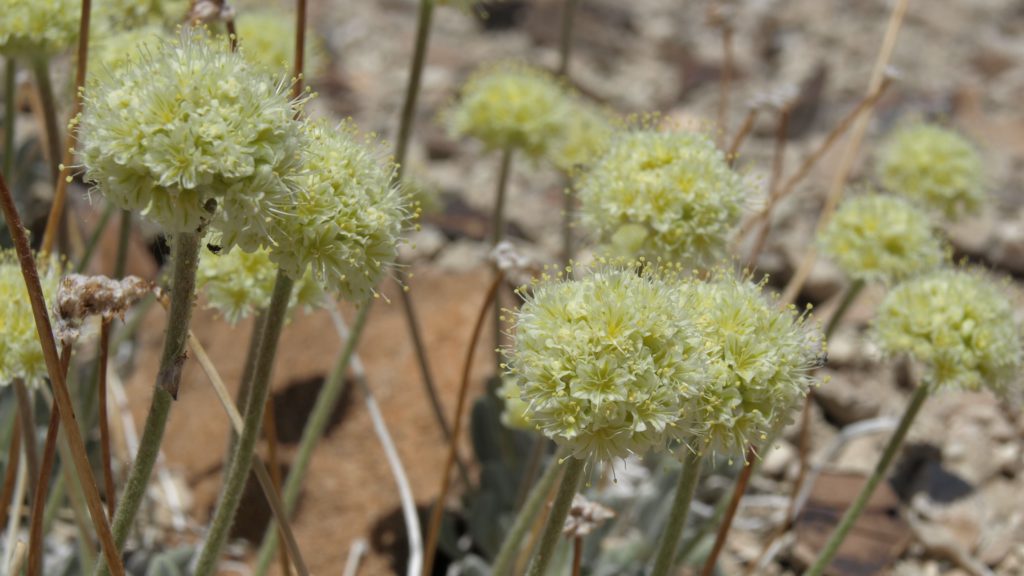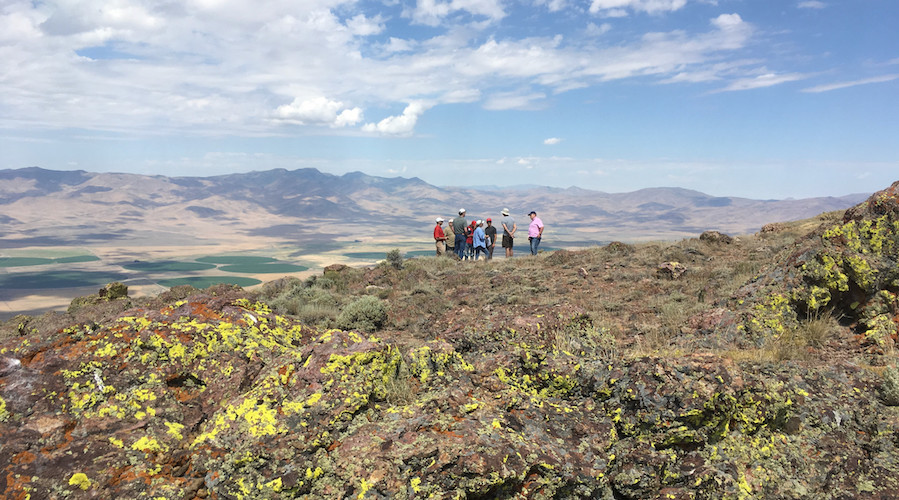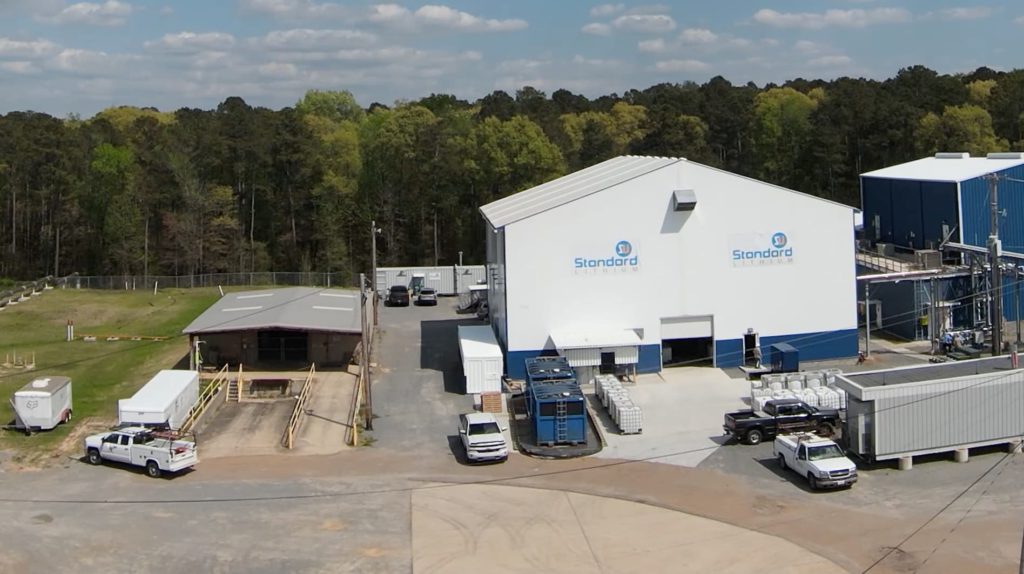Reuters | October 31, 2024 |

Tiehm’s Buckwheat flower. (Credit: Flickr – Jim Morefield)
Environmental and Indigenous groups on Thursday filed a lawsuit challenging the US Interior Department’s approval of ioneer’s Rhyolite Ridge lithium mine in Nevada, the first domestic source of the battery metal to be permitted by Democratic President Joe Biden’s administration.

In a lawsuit filed in federal court in Las Vegas, groups including the Center for Biological Diversity argued the project posed an existential risk to the rare wildflower Tiehm’s buckwheat and could drive it to extinction.
They said the mine would also adversely impact groundwater, springs, wetlands, air quality, cultural resources and wildlife habitats, and would transform a remote part of rural Nevada into an industrial complex.
The groups said the Interior Department’s Bureau of Land Management (BLM) approved the mine without ensuring that it would not jeopardize the wildflower or unduly impact the environment in violation of the National Environmental Policy Act, the Federal Lands Policy and Management Act, and the Endangered Species Act.
The Interior Department declined to comment.
Australia-based ioneer said it does not expect the lawsuit to “meaningfully affect our proposed development timeline” and that it believes the project can be developed sustainably.
“We are confident that the BLM will prevail against this lawsuit,” said Chad Yeftich, ioneer’s vice president of corporate development and external affairs. “We intend to intervene and vigorously defend the BLM’s decision, which was based on its careful and thorough permitting process.”
The critical minerals miner received approval for the mine last week following a more-than six-year review process during which regulators, ioneer and conservationists tussled over the fate of Tiehm’s buckwheat.
The permit cleared the way for development of a mine that will become a key supplier to Ford Motor and other electric-vehicle manufacturers. It was issued amid a flurry of recent moves by Biden administration officials to support critical minerals production and offset China’s market dominance.
The permit also unlocked a $700 million loan from the US Department of Energy, as well as a $490 million equity investment from Sibanye Stillwater to fund the project.
The Interior Department said when it approved the mine that it had taken numerous steps to protect the ecosystem near the mine site, roughly 225 miles (362 km) north of Las Vegas.
The project contains enough lithium to power roughly 370,000 EVs each year. Construction is slated to begin next year, with production commencing by 2028.
(By Nate Raymond and Ernest Scheyder; Editing by Matthew Lewis)
US Energy Dept finalizes $2.26bn loan for Lithium Americas’ Nevada mine
Reuters | October 28, 2024 |

Thacker Pass is projected to begin lithium production in the second half of 2026. (Image courtesy of Lithium Americas.)
The US Department of Energy finalized a $2.26 billion loan for Lithium Americas on Monday to build Nevada’s Thacker Pass lithium mine, one of Washington’s largest mining industry investments and part of a broader push to boost critical minerals production.

The loan, provisionally approved in March, is a key part of US President Joe Biden’s efforts to reduce dependence on lithium supplies from China, the world’s largest processor of the electric vehicle battery metal. Biden officials permitted a similar lithium project under development by ioneer last week.
The Thacker Pass project is slated to open later this decade and be a key supplier to General Motors, which earlier this month boosted its investment in the mine to nearly $1 billion.
“The Biden-Harris Administration recognizes mineral security is essential to winning the global clean energy race,” said Ali Zaidi, the White House national climate advisor.
Former President Donald Trump had permitted the mine just before leaving office. Initial construction at the site, just south of Nevada’s border with Oregon, started last year after the company won a long-running and complex court case brought by conservationists, ranchers and Indigenous communities.
With the loan now closed, Vancouver-based Lithium Americas plans to start major construction, a process that could take three years or longer. The mine’s first phase is expected to produce 40,000 metric tons of battery-quality lithium carbonate per year, enough for up to 800,000 EVs.
The project is expected to employ about 1,800 people during construction, and provide 360 full-time jobs once the mine is operational. The loan will have a 24-year term, with interest rates based on the US Treasury rate as each tranche is drawn.
“This essential loan helps us reduce dependence on foreign suppliers and secure America’s energy future,” said Lithium Americas CEO Jon Evans.
The mine’s cost had been increased from a previous estimate of $2.27 billion to nearly $2.93 billion due to higher engineering costs, an agreement to use union labor, and the company’s decision to build a housing facility for workers and their families in the remote region.
(By Ernest Scheyder; Editing by Richard Chang)
Koch inks first lithium deal backed by recovery-rate promise
Bloomberg News | October 28, 2024 |

Credit: Standard Lithium Ltd.
Koch Inc. signed a deal with a US lithium venture to provide technology that includes an industry-first guarantee of recovering at least 95% of the metal from salty water using its new extraction methods.

The company’s Koch Technology Solutions unit agreed to license its so-called direct lithium extraction process to a joint venture of Standard Lithium Ltd. and Equinor ASA for use in a planned commercial plant in southwest Arkansas, the firms said Monday in a statement.
The technology strips out lithium directly from brine in a process that promises to be cheaper, faster and cleaner than the traditional lithium extraction methods used in South America, a region with about half of the world’s reserves. Dozens of firms have been working on improved extraction methods collectively known as DLE, though they’ve yet to be proven at a commercial scale.
The Koch agreement includes a performance guarantee — promising a lithium recovery rate that is about double the rate from the common practice of relying on recovering the metal from evaporation ponds. This is the first time a technology provider has stated in a binding agreement that its process is going to work, backing it with a specific number for how much lithium can be recouped from salty wate
Bloomberg News | October 28, 2024 |

Credit: Standard Lithium Ltd.
Koch Inc. signed a deal with a US lithium venture to provide technology that includes an industry-first guarantee of recovering at least 95% of the metal from salty water using its new extraction methods.

The company’s Koch Technology Solutions unit agreed to license its so-called direct lithium extraction process to a joint venture of Standard Lithium Ltd. and Equinor ASA for use in a planned commercial plant in southwest Arkansas, the firms said Monday in a statement.
The technology strips out lithium directly from brine in a process that promises to be cheaper, faster and cleaner than the traditional lithium extraction methods used in South America, a region with about half of the world’s reserves. Dozens of firms have been working on improved extraction methods collectively known as DLE, though they’ve yet to be proven at a commercial scale.
The Koch agreement includes a performance guarantee — promising a lithium recovery rate that is about double the rate from the common practice of relying on recovering the metal from evaporation ponds. This is the first time a technology provider has stated in a binding agreement that its process is going to work, backing it with a specific number for how much lithium can be recouped from salty wate
No comments:
Post a Comment